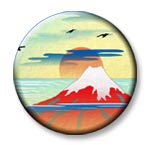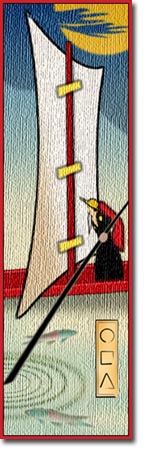On The Way: The Daily Zen Journal
Readings from Sun Face Buddha
Fen-chou Wu-yeh (761-823)
There was a monk who asked the Master, “The twelve divisions of the teaching have spread through this land; the number of those who have obtained the fruits of the Way does not stop at one or two. How is it that the Patriarch has come to the East and has proclaimed a separate mysterious teaching which directly points to the human mind, whereby one can perceive one’s nature and become a Buddha?
How is it possible that there is something missing in the teachings that the Bhagavat has spoken? In the past all virtuous high monks thoroughly studied the nine orifices and clearly penetrated the teachings of the tripitaka. Tao-sheng, Seng-chao, Tao-jung, Seng-jui: all of them were extraordinary people. How can it be that they did not understand Buddhadharma? May the Master be kind enough to instruct this ignorant person?”
The Master said, “All the Buddhas have not appeared in the world, nor has there been a single teaching that they have given to people. The twelve divisions of the teaching are like medicines that are used to cure various diseases. It is like sweet fruit used to change the taste of bitter calabash.
“They are all for the sake of cleaning away your karma-there is nothing real about them. The spiritual powers and transformations, as well as hundreds and thousands of samadhis are for the sake of converting the heavenly demons and the heretics.
“The two adornments of blessings and wisdom are for the sake of destroying the views of attachment to existence and abiding in emptiness. If one does not understand the Way and the meaning of the Patriarch’s coming form the West, then what use is there in speaking about Tao-shen, Seng-chao, Tao-jung, and Seng-jui?

“Nowadays those who explain Ch’an and explain the Way are as many as the sands of the Ganges. Those who speak about Buddha and mind count in millions. If there is even a tiny speck of dust remaining, then one still has not left the wheel of birth and death. If all thinking is not gone, then one is certain to fail completely.
“These kind of people don’t themselves understand about cause and effect, and falsely speak about benefiting oneself and benefiting others. They consider themselves to be superior people equal to the former worthies.
“They say that whatever comes in contact with the eye is Buddha activity, and that wherever the foot is set is bodhimanda. Their original practice cannot be compared even with that of an ordinary person who only keeps the five precepts and the ten wholesome ways of action.
“When they start speaking, they slight those of the two vehicles and the Bodhisattvas of the ten stages. Though the superior taste of ghee is considered rare and precious in the world, when it comes in contact with these it turns into poison. Even Nan-shan didn’t allow to call himself Mahayana.
“All those who are engrossed in studying words, when arguing with eloquence they loudly discuss that which is without form. It is so pitiable when compared with the ancient worthies. Like a gentleman of noble character who gives up his wealth and position, and goes to live in the wilderness, using a stone as a pillow and a stream to rinse himself. Though he has the ability to pacify the country and govern the people, when called by the emperor he refuses to go.
“How can they be the same as those who, greedy for fame and desirous of wealth, sink into the worldly ways? It is like a peddler who by seeking small profit loses great gains. If the sages of the ten stages have not realized the principle of the Buddhas, then wouldn’t they be like ordinary people with great learning? There is no such thing really.
“Even though he could speak the Dharma as eloquently as clouds and rain, he was still scolded by the Buddha, who said, ‘Seeing the nature is like dividing thin silk.’ As long as there is feeling of holiness, and views about cause and effect, one has still not been able to transcend the feeling of sacredness nor go beyond shadows and traces.
“The former sages and ancient worthies were eminent people of great learning who were familiar with the past and the present, and had clear insight into the Teaching. Yet, despite all of their learning and eloquence, they still could not distinguish between milk and water. Not knowing themselves, they sought reality by calming their thoughts.
“There might be someone who has awakened to the principle, and yet still has certain knowledge and understanding. Because of not knowing that within awakening one enters the principle, he considers himself as being beyond worldly advantage. Walking through mountains and sitting besides streams, he slights the path to Nirvana.
“If one’s mind is not completely free from outflows, and one is not clear about the fundamental reality, then one’s whole life will be wasted without accomplishing anything. Karma cannot be overcome by cleverness; dry wisdom cannot help one to escape the wheel of suffering.
“Even if one has eloquence equal to that of Asvaghosa, or understanding like that of Nagarjuna, one can still avoid losing the human body for only a lifetime or two. Profound thoughts, innate purity, ability for immediate comprehension-just like Tao-sheng-all of that is not something to be envious about, because that is still far away from the Way.
“Bodhisattvas who study prajna do not deceive themselves. They are like someone who is walking on ice or on the blade of a sharp sword. If at the time of one’s death one still has any feeling of ordinary or holy that has not been let go of, any subtle thought that has not been forgotten, then one receives birth according to one’s thoughts. At that time all one’s former practices, thoughts, views, and wisdom will be lost in an instant.
“If you cherish any desires, then you will be tied down to the twenty five abodes of living beings, never accomplishing anything.
“The Patriarch Bodhidharma perceived that the people of this country had the potential for receiving Mahayana, so he only pointed to people’s confused feelings and transmitted the mind-seal. If one attains this, then one does not discriminate between ordinary and holy, ignorance and wisdom. A lot of falsehood is not as good as a bit of truth.
“The true person should right now put to rest the myriad conditions, transcend the stream of birth and death, and, going beyond rules and patterns, perceive the spiritual light which shines solitary. Not hindered by things and events, dignified and upright, one walks alone in the three realms.
“Then even without seeking them, retinues and various adornments are naturally present, and mountains, rivers, and the great earth cannot hinder one’s sight. One attains the great dharani (mantra, mystical invocation) and is able to understand one thousand meanings on a single hearing. One is not seeking even as much as the value of a single meal.
“If you are not like this, then the Patriarch’s coming to this land has brought both benefit and loss. As to benefit, among hundreds and thousands of people, one can pick one, or half, who is a Dharma vessel. As to loss, that has been explained already.
“Let then them practice according to the teachings of the three vehicles, so that they can obtain the four fruits and the three virtuous stages, thereby making some progress in their practice. That is why a former worthy has said, ‘If one has realization, then one perceives that the karmic obstacles are fundamentally empty; without realization, one still has to repay one’s debts.’”
Fen-chou Wu-yeh (761-823)
Excerpted from Sun-Face Buddha: The Teachings of Ma-Tsu and the Hung-Chou School of Ch’an




Song of the Grass-Roof Hermitage
I’ve built a grass hut where there’s nothing of value.
After eating, I relax and enjoy a nap.
When the hut was completed, fresh weeds appeared.
Now it’s been lived in-covered by weeds.
The person in the hut lives here calmly,
Not stuck to inside, outside, or in-between.
Places worldly people live, he doesn’t live.
Realms worldly people love, she doesn’t love.
Though the hut is small, it includes the entire world.
In ten feet square, an old man illumines form and their nature.
A Mahayana bodhisattva trusts without doubt.
The middling or lowly can’t help wondering;
Will this hut perish or not?
Perishable or not, the original master is present,
Not dwelling south or north, east or west.
Firmly based on steadiness, it can’t be surpassed.
A shining window below the green pines
Jade palaces or vermillion towers can’t compare with it.
Just sitting with head covered all things are at rest.
Thus this mountain monk doesn’t understand at all.
Living here he no longer works to get free.
Turn around the light within, then just return.
The vast inconceivable source can’t be faced or turned away from.
Meet the ancestral teachers, be familiar with their instruction,
Bind grasses to build a hut and don’t give up.
Let go hundreds of years and relax completely.
Open your hands and walk, innocent.
Thousands of words, myriad interpretations
Are only to free you from obstructions.
If you want to know the undying person in the hut,
Don’t separate from this skin bag here and now.
By Shitou Xiqian (700-790)
In Dedication,
Elana